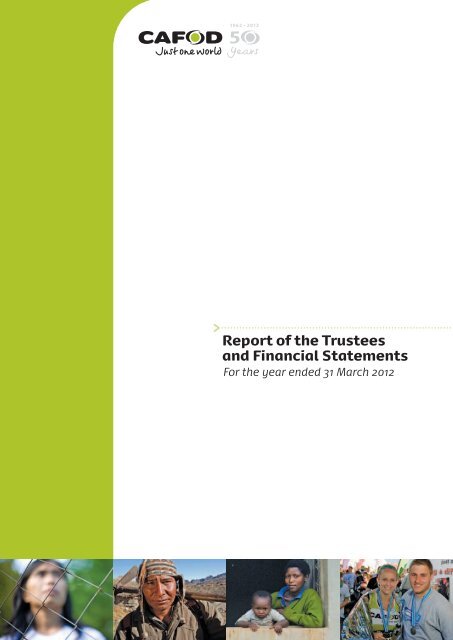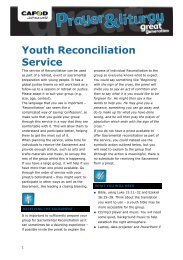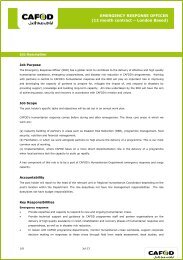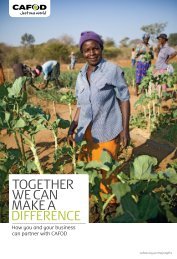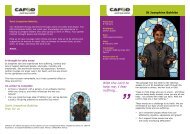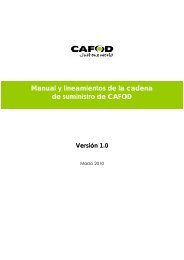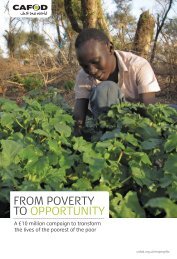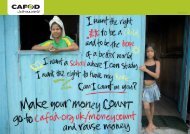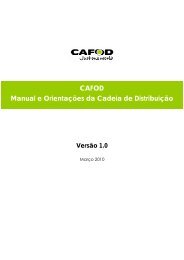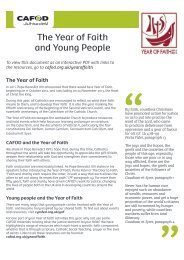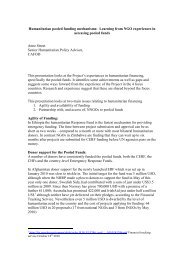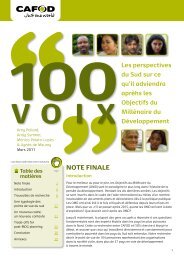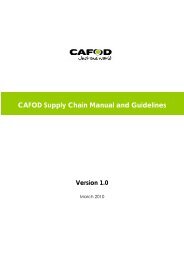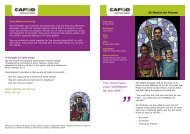CAFOD Trustees Report and Financial Statements 2011-2012
CAFOD Trustees Report and Financial Statements 2011-2012
CAFOD Trustees Report and Financial Statements 2011-2012
You also want an ePaper? Increase the reach of your titles
YUMPU automatically turns print PDFs into web optimized ePapers that Google loves.
Contents> <strong>Report</strong> of the <strong>Trustees</strong>: pages 1 – 28• Letter from the Chair• Overview• Objectives <strong>and</strong> activities• Achievements <strong>and</strong> performance• <strong>Financial</strong> review• <strong>CAFOD</strong>’s priorities for <strong>2012</strong>/2013• Structure, governance <strong>and</strong> management> Independent auditor’s report: page 29> Statement of f inancial activities: page 31> Balance sheet: page 32> Cash flow statement: page 33> Notes to the f inancial statements: pages 34 – 46> Organisational details: page 47
As we celebrate ourf irst f ifty years, <strong>CAFOD</strong>recommits itself towork for a world whereevery human personcan flourish <strong>and</strong> live inpeace, with dignity.In preparation for the Olympics, we unveiled Pass it On, <strong>CAFOD</strong>’sOlympics peace campaign aimed at children <strong>and</strong> young people inEngl<strong>and</strong> <strong>and</strong> Wales. Inspired by the 100 days truce that accompaniedthe Ancient Olympics, we are encouraging young supporters to takepart in the online initiative by uploading video clips <strong>and</strong> postingpersonal messages to all those in the world who are not living inpeace in <strong>2012</strong>.I’m very proud of what we’ve achieved this year, but with more than abillion people still living in absolute poverty, we know that there is stillmuch more work to do. As well as reflecting on our achievements thisyear, this report also sets out our priorities for next year, <strong>and</strong> our vision<strong>and</strong> capacity to bring about more lasting change.I feel very honoured to have become <strong>CAFOD</strong>’s Chair of <strong>Trustees</strong> thisyear, succeeding Bishop John Rawsthorne who had overseen so muchcrucial growth <strong>and</strong> development in the organisation. As we celebrateour first 50 years, <strong>CAFOD</strong> recommits itself to work for a world whereevery human person can flourish <strong>and</strong> live in peace, with dignity. Atthe heart of what we believe, <strong>and</strong> what brings us into communionwith one another, is that God loves us <strong>and</strong> calls us to love the peoplearound us, particularly those in most need. The ongoing challenge isdaunting, but together we can succeed <strong>and</strong> achieve so much. Thankyou for whatever part you are able to take that makes all this possible.Rt. Rev. John ArnoldAuxiliary Bishop in Westminster, Chair of the <strong>Trustees</strong>3rd July <strong>2012</strong>2
OverviewThis map shows the countries in which grants were made to <strong>CAFOD</strong>’soverseas partners for development programmes <strong>and</strong> emergency reliefduring the year April <strong>2011</strong> to March <strong>2012</strong>.“<strong>CAFOD</strong> has done its part. We have done our part.Those we work with are now able to st<strong>and</strong> on theirown two feet – they no longer depend on our HIVprogramme; they no longer depend on <strong>CAFOD</strong>. Thatis empowerment.”Sister Pascalina Mambwe, Franciscan Missionary Sistersof Assisi in Zambia, <strong>CAFOD</strong> partner<strong>CAFOD</strong> Offices<strong>CAFOD</strong> staff basedwith partners<strong>2011</strong>/12 was a record year for income including a huge response fromsupporters to the <strong>2012</strong> Lent Fast Day appeal, a substantial part of whichwas received at the very end of our financial year. This will boost ourprogrammes for next year <strong>and</strong> beyond.10%12%22%Income– in <strong>2011</strong>/12 we raised £61mn Government <strong>and</strong> other grants (22%)1%n Interest <strong>and</strong> other income (1%)n Supporters’ donations (55%)n Gifts in wills (10%)55%n Caritas network (12%)LATIN AMERICA & CARIBBEAN6%5%11%Expenditure– in <strong>2011</strong>/12 we spent £55mn International Development (45%)45%n Disaster Relief (33%)n Development education (5%)33%n Advocacy <strong>and</strong> campaigning (6%)n Generating funds & governance (11%)We worked in Bolivia, Brazil, Colombia,El Salvador, Guatemala, Haiti, Honduras,Mexico, Nicaragua, Paraguay <strong>and</strong> Peru.3% of our grants went to UK <strong>and</strong> global partners to help raise underst<strong>and</strong>ing ofthe causes of poverty <strong>and</strong> social injustice.15% of our grants were made to partnersin this region in <strong>2011</strong>/12.3
Objectives<strong>and</strong> activitiesOur vision is a world transformed to reflect the Kingdom ofGod: a world where –> the rights <strong>and</strong> dignity of every person are respected.> all have access to basic needs in life.> women <strong>and</strong> men share equally in shaping their societies<strong>and</strong> our world.> the gifts of creation are nurtured <strong>and</strong> shared by all for thecommon good.> the structures that shape people’s lives are just <strong>and</strong> enable peace.Our mission<strong>CAFOD</strong> is the official aid agency of the Catholic Church in Engl<strong>and</strong> <strong>and</strong>Wales <strong>and</strong> part of the global Caritas family. Together with our partners<strong>and</strong> the global Caritas family, we:Together with ourpartners, we strive toreduce the impact ofpoverty, to address <strong>and</strong>challenge its root causes,<strong>and</strong> to empower peopleto bring about changefor themselves.> Work with poor <strong>and</strong> disadvantaged communities in the globalSouth to overcome poverty <strong>and</strong> bring about sustainabledevelopment <strong>and</strong> well-being.> Protect lives <strong>and</strong> relieve suffering during emergencies; reducethe risks to vulnerable communities as a result of conflict <strong>and</strong>natural disasters.> Raise awareness <strong>and</strong> underst<strong>and</strong>ing of the causes of poverty <strong>and</strong>injustice to inspire a commitment to lasting change.> Challenge those with power to adopt policies <strong>and</strong> behaviour thatpromote social justice <strong>and</strong> end poverty.To fulfil this fourfold mission we raise funds <strong>and</strong> mobilise action fromthe Catholic community <strong>and</strong> beyond.ActivitiesIn fulfilling our mission, we work in more than 40 countries worldwide.The majority of our work is done in partnership – with localcommunities in the global South, with sister agencies across the world,<strong>and</strong> with the Catholic community in Engl<strong>and</strong> <strong>and</strong> Wales. Together withour partners, we strive to reduce the impact of poverty, to address<strong>and</strong> challenge its root causes, <strong>and</strong> to empower people to bring aboutchange for themselves.5
Achievements<strong>and</strong> performanceIntroductionOur strategic framework, ‘Just One World,’ impels us to work withthe poorest <strong>and</strong> most disadvantaged communities in Africa, Asia,Latin America <strong>and</strong> the Middle East. This year, with the support of ourpartners on the ground, we have made significant progress against ourfour main aims.> Aim 1Increasing power <strong>and</strong> influence ...so that women <strong>and</strong> men in the poorest <strong>and</strong> most disadvantagedcommunities are able to influence the systems, decisions <strong>and</strong>resources affecting them, living under governments, institutions <strong>and</strong>global structures that are just <strong>and</strong> accountable.What have we achieved this year?We believe that people living in poverty have the right to influencepolicies <strong>and</strong> decisions that affect their lives. Part of our work is toamplify their voices so that they can be heard.200,000In São Paulo 200,000families live insub-st<strong>and</strong>ard ordangerous houses <strong>and</strong>one in ten homes haveno proper electricity orsewerage systems.Influencing change on the groundWhen our partners feel that a particular policy might harm thecommunities they work with, they speak up, <strong>and</strong> it is our job tosupport them in challenging the decision makers.… in AfghanistanThis year, we have been supporting a partner in Herat province toincrease women’s power <strong>and</strong> influence within their families. Morethan 500 men <strong>and</strong> women have so far take part in workshopsdesigned to promote peace <strong>and</strong> better underst<strong>and</strong>ing within families.Changing deeply entrenched attitudes <strong>and</strong> behaviour takes time, buttestimonials include stories of husb<strong>and</strong>s no longer hitting their wives,as well as women <strong>and</strong> men resolving long-st<strong>and</strong>ing conflicts betweenfamilies. A male participant explains, “before this workshop I had dailyconflict with my wife, but now I know more about the bad impactviolence can have on family members <strong>and</strong> the community. Thanksto these workshops I now know how to better treat my wife <strong>and</strong> hermother as well.”… in BrazilIn São Paulo, paradoxically one of Brazil’s richest cities, more than200,000 families live in sub-st<strong>and</strong>ard or dangerous houses <strong>and</strong> one inten homes have no proper electricity or sewerage systems. Togetherwith local groups we have set up the Urban Programme which seeks toimprove the quality of housing <strong>and</strong> basic services for families living inthe shanty towns <strong>and</strong> tenement blocks of São Paulo.7
our support has helped to change the way they underst<strong>and</strong> <strong>and</strong> carryout their advocacy work <strong>and</strong> to learn from each other. The report citesmany examples where strategies have opened up new opportunitiesto engage with decision makers <strong>and</strong> potential allies....in East TimorMoney from natural oil <strong>and</strong> gas is the biggest source of income forEast Timor. But most people know little about it <strong>and</strong> don’t see anybenefits. <strong>CAFOD</strong> is supporting local partner Luta Hamutuk to mobilise<strong>and</strong> coordinate local people, ensuring they have a say, <strong>and</strong> a share ofthe benefit from the country’s profitable resources. In Liquica district,Luta supported the local community <strong>and</strong> village chiefs to engagewith the Ministry of Education, which resulted in their obtaining moreschool equipment for 152 students.“Events like thislobby are a matter offaith because of theexample of Christwho preached justice<strong>and</strong> compassion <strong>and</strong>considered the poor in avery special way. Today,we’re trying to follow inhis footsteps.”Sr Monica Butler, East HamThirty-year-old housewife Celestina de Jesus Correia dropped outof school in the sixth grade. Attending Luta’s workshops has givenher the confidence to speak in public <strong>and</strong> participate in activitieslike monitoring <strong>and</strong> advocacy, activities traditionally reservedfor men. “Now I learn how to write reports,” she says. “I am moreconfident to sit with men to discuss problems in my village, moreconfident to speak in the public, to support people in my village toresolve their problems.”Influencing change globally<strong>CAFOD</strong> has continued to play a strong leadership role in Beyond 2015,the campaign which <strong>CAFOD</strong> co-founded <strong>and</strong> now co-chairs. It aims toensure that the UN <strong>and</strong> our own government do not let the MillenniumDevelopment Goals (MDGs) run their course without putting in placesome tangible commitments to continue the fight against poverty.This year we led a group of 60 organisations in lobbying the UNSecretary General’s office for an inclusive <strong>and</strong> participative planningprocess for what comes after the MDGs. We were delighted that theDeputy Secretary General endorsed this call <strong>and</strong> has asked Beyond2015 to nominate a representative to sit on the High Level Panel onpost-MDGs. <strong>CAFOD</strong>’s work was described as playing a ’vital role’.Influencing change in the UK<strong>CAFOD</strong> lobbies the UK government to make sure it is aware ofthe situation of people in the South, <strong>and</strong> to push for change. Ourthous<strong>and</strong>s of supporters take action with us <strong>and</strong> help to make ourvoice all the stronger.<strong>CAFOD</strong> played a leading role among UK aid agencies in hosting TeaTime for Change in June <strong>2011</strong> where we pressed the government toratify in law its pledge of spending 0.7 per cent of national income oninternational aid:> Over 600 <strong>CAFOD</strong> supporters lobbied their local MP> Prime Minister David Cameron has since recommitted thegovernment to reach the 0.7 per cent promised target.9
Aim 2Promoting sustainable development ...so that women <strong>and</strong> men in the poorest <strong>and</strong> most disadvantagedcommunities have access to the essential services <strong>and</strong> resourcesthey need to live sustainably, with dignity.What have we achieved this year?In the current economic climate, with growth in most Westerneconomies at a st<strong>and</strong>still, it is as vital as ever for <strong>CAFOD</strong> to take theneed for effective <strong>and</strong> long-term sustainable development seriously.In trying to make a living for themselves <strong>and</strong> their families, the peoplewe work with face many challenges: rising global prices, increasedinflation, the effects of a changing climate, the impact of conflict <strong>and</strong>natural disaster.> In <strong>2011</strong>/12, 82,252 more families, in 35 countries of Africa, Asia <strong>and</strong>Latin America, had enough food to feed themselves.82,252In <strong>2011</strong>/12, 82,252 morefamilies, in 35 countriesof Africa, Asia <strong>and</strong> LatinAmerica, had enoughfood to feed themselves.We work with partners to promote sustainable <strong>and</strong> organicapproaches to agriculture… in El Salvador<strong>CAFOD</strong> partner Jesuit Development Service works closely with BancosVivos Communitarios (Live Community Banks) to set up local ’banks’where farmers store their crops. It means farmers have qualitynative seeds on their doorstep, <strong>and</strong> by holding onto crops until theprice is right, <strong>and</strong> finding other markets as a group, they can makemore money. Banks are managed by community members, withnear equal participation of men <strong>and</strong> women as members <strong>and</strong> on themanagement committees.> 137 farmers improved their livelihoods by adopting new practices toproduce <strong>and</strong> use organic fertiliser <strong>and</strong> conserve native seeds, thusreducing production costs.…in Ethiopia> 1,142 families increased the amount of food they were able to grow<strong>and</strong> made extra money by selling the surplus> 265 families received goats> 260 women received chickens, enabling them to introduce eggs intofamily diets <strong>and</strong> make money from sales.… in BangladeshFloods destroyed agricultural plots that were earmarked for new cropswhich were inundated with saline water. Despite these challenges,> 150 of 600 families said their livelihood had still improved> in two areas unaffected by flooding, families managed to increasetheir vegetable production <strong>and</strong> to make a profit as a result of thestart-up small business enterprises.10
We work with partners to support small business enterprisesIn <strong>2011</strong>/12, through our partners, we supported 11,170 households intheir small businesses.… in East Timor> 142 households taking part in small business group enterprisesincreased their revenue from sales> the most successful enterprise was blacksmithing where thegroup produced agricultural tools for several government <strong>and</strong>international organisations.… in ColombiaThis year we completed a five-year programme supporting vulnerablepeople who are driven from their homes by violent conflict or whoface discrimination within their communities. Key to its success hasbeen the support <strong>CAFOD</strong> has given to partners who in turn help peopleovercome the emotional <strong>and</strong> practical issues they face. As a result> 71 families are now able to earn a regular income from smallbusinesses developed as part of this project.Edwin <strong>and</strong> Estherhave been part of theHIV Home-Based CareProgramme in Zambiasince 2005 when theywere diagnosed withHIV. Through theprogramme, they havelearned how to preventthe transmission of HIVfrom mother to child, <strong>and</strong>Esther has since givenbirth to three childrenwho all tested negativefor HIV.… in LiberiaSmall loans have begun to change the power dynamic betweenmen <strong>and</strong> women in some local communities. Our partner the SENDFoundation has been making loans for small-scale businessesinvolving young women, who report being appreciated more by theirhusb<strong>and</strong>s because of the economic contribution they are able to maketo the household. Many more men now underst<strong>and</strong> the positive role ofwomen in their communities.> 730 young women across Liberia given loans to start smallbusinesses <strong>and</strong> create sustained employment opportunities.… in Afghanistanthe quality of saffron being grown <strong>and</strong> processed by 1,800 men <strong>and</strong>women saffron growers in Herat province has increased <strong>and</strong> nowexceeds international st<strong>and</strong>ards. The growers themselves say thatthis is a direct result of our partner’s training on pre- <strong>and</strong> post-harvesttechniques in the past year.We work alongside those living with <strong>and</strong> affected by the impact of HIVIn <strong>2011</strong>/12:> 90,788 women, men <strong>and</strong> children have benefitted from a holisticrange of healthcare services> in a sample survey, 62 per cent of women <strong>and</strong> men living with <strong>and</strong>affected by HIV in programmes supported by <strong>CAFOD</strong>, providedevidence that their quality of life had improved....in ZambiaOur partners in Ndola Diocese tell us about the changes which havecome about as a result of <strong>CAFOD</strong>’s support for the HIV Home-BasedCare Programme.11
The daily water supply has doubled in Marsabit, the rural aridnorthern area of Kenya, as a result of repairing boreholes <strong>and</strong>installing new tanks, pipes <strong>and</strong> a generator> In rural Kenya, where access to power is very difficult, solar poweris changing the lives of 301,996 families with the introduction ofsolar-powered water pumps, water purification systems, waterheaters <strong>and</strong> even solar powered computers <strong>and</strong> printers.Working with the Diocese of Marsabit in northern KenyaSmall grants for vulnerable householdsIn Marsabit, where most people rely on cattle, goats <strong>and</strong> sheep tomake a living, the drought was a disaster, killing their animals <strong>and</strong>crops <strong>and</strong> causing a huge rise in food prices. <strong>CAFOD</strong> supported thediocese in a project with five components:> improving access to safe water> cash for work schemes> unconditional small grants for the most vulnerable> health <strong>and</strong> hygiene> construction of water pans for livestock.Our support also included our own emergency response staff workingalongside partners.30,000Food, water, healthcare,shelter <strong>and</strong> sanitationprogrammes havehelped to improve thelives of 30,000 peoplein South Sudan.Our partners told us of the impact of the unconditional small grantsfor one family:“Khorosunto is a widow with four children, one boy <strong>and</strong> three girls. Sheis very poor <strong>and</strong> has no source of income <strong>and</strong> no means of earning aliving. She does not have access to enough food to ensure her familyeat all necessary meals per day, has no money to provide her familywith medical care or to educate her children. With the money (fromMarsabit diocese) she has been able to provide her family with at leastthree meals per day which are well balanced. She is able to purchasea variety of food, <strong>and</strong> pay her basic medical bill. She has also usedpart of the money to start a small business in which she sells itemslike sugar, tea leaves, tobacco, maize <strong>and</strong> beans. This means thatthe support has not only helped her through the immediate crisis buthas also provided a sustainable benefit that will continue after theimmediate relief phase is over.”…in South SudanOn 9 July <strong>2011</strong>, South Sudan gained independence from Sudan afterthe 2005 peace deal that ended Africa’s longest-running civil war.As the world’s media watched, <strong>CAFOD</strong> has continued to providehumanitarian assistance to this new born nation.> Food, water, healthcare, shelter <strong>and</strong> sanitation programmes havehelped to improve the lives of 30,000 people while peace efforts,especially in the border areas, are being made to provide stability.13
216.47A total of 216.47 metrictonnes of food weredistributed duringOctober to March– the hungry seasonin Zimbabwe.…in Zimbabwe<strong>CAFOD</strong> supported Caritas Partners in Harare, Masvingo, Bulawayo<strong>and</strong> Nyanga to work with hospitals to ensure vulnerable patients <strong>and</strong>staff had access to food. The programme ensured that patients hadgood quality food – including corn soya blend, which is fortified withvitamins – <strong>and</strong> regular meals. One Government hospital was helpedto ensure that their food supplies were sustainable <strong>and</strong> that theyhad enough food for patients <strong>and</strong> members of staff. A garden at thehospital was rehabilitated, so it could be used for growing vegetables<strong>and</strong> rearing chickens.The good quality food provided through the programme meant thatpatients had a much healthier diet, <strong>and</strong> regular meals. This meant thatpatients’ health improved <strong>and</strong> any side effects from medication, forillnesses such as tuberculosis <strong>and</strong> HIV, were reduced, <strong>and</strong> medicationswere more effective. Chickens reared at the Government hospital havebecome an excellent, sustainable, source of income <strong>and</strong> food for thepatients <strong>and</strong> staff.> A total of 216.47 metric tonnes of food were distributed duringOctober to March – the hungry season in Zimbabwe> An average of 530 inpatients, 1,500 outpatients <strong>and</strong> 420 hospitalstaff received food each month.…in PakistanIn response to flooding in the south of Pakistan last year, affectingmostly areas which had been spared in 2010, we supported the fastdelivery of emergency aid, which included food <strong>and</strong> items such ascooking utensils <strong>and</strong> blankets.> More than 35,000 people, many of them marginalised minorityfamilies, received direct help> More than 200,000 people affected by 2010 flooding have beensupplied with clean water, seeds, animals <strong>and</strong> information abouthygiene, as well as help in preparing for future disasters.…in HaitiThe second year of our response to the Haiti earthquake built onthe lessons <strong>and</strong> successes of the previous year. The DisastersEmergency Committee (DEC) evaluated our DEC-funded work <strong>and</strong>reported positively on its quality <strong>and</strong> impact. They praised ourdecision to work with local partners rather than establish a <strong>CAFOD</strong>presence on the ground, concluding that our projects had reached“some of the neediest Haitians <strong>and</strong> with a solid impact beyond theemergency response”.> Almost 40,000 people benefited from water, sanitation <strong>and</strong> solidwaste management services.14
Aim 4Building our partnerships in the Catholic community ...so that Catholics in Engl<strong>and</strong> <strong>and</strong> Wales are inspired to challengeglobal poverty through prayer, action <strong>and</strong> giving, so transformingtheir own lives.What have we achieved this year?As Bishop John Arnold, <strong>CAFOD</strong>’s Chair of <strong>Trustees</strong>, said in his homilyat <strong>CAFOD</strong>’s 50th anniversary Mass in Westminster Cathedral: “theCatholic community in Engl<strong>and</strong> <strong>and</strong> Wales have been spectacularin their giving to <strong>CAFOD</strong>, year on year, <strong>and</strong> more so during times ofdrought, earthquake <strong>and</strong> tsunami. In so many schools <strong>and</strong> parishes,<strong>CAFOD</strong> is a familiar word <strong>and</strong> its work well-known <strong>and</strong> appreciated.”It is because of this reciprocal <strong>and</strong> generous relationship with Catholicsin Engl<strong>and</strong> <strong>and</strong> Wales that we have been able to do our work, fightingfor a fairer world, for 50 years.65,180Supporters in Engl<strong>and</strong><strong>and</strong> Wales signed65,180 campaigncards calling on thegovernment to takeaction on access toclean water for thoseliving in poverty.The 50th anniversary Mass in Westminster Cathedral in January<strong>2012</strong>, celebrated with supporters, clergy <strong>and</strong> bishops from across thecountry, marked the beginning of a year of celebration. But it alsogave us a chance to look forward to a continuing working partnershipwith Catholic parishes, schools <strong>and</strong> individuals to tackle globalpoverty together.Lent <strong>2012</strong>In an effort to make this the most successful ever Lent appeal,we worked hard to create a strong, integrated campaign, offeringsupporters clear ways to give, act <strong>and</strong> pray. We concentrated on tellingsimple, thought-provoking stories of people’s struggle to get thatmost basic <strong>and</strong> essential of resources – clean water – <strong>and</strong> supportersresponded in their thous<strong>and</strong>s with unprecedented generosity, raising arecord £9.1million – almost £7million more than last year.Supporters also signed 65,180 campaign cards calling on thegovernment to take action on access to clean water for those livingin poverty. Andrew Mitchell, Secretary of State for InternationalDevelopment, accepted the cards at No 10 Downing Street <strong>and</strong> praisedthe campaign: “We love <strong>CAFOD</strong>. You are brilliant. Thank you very muchfor what you are doing: it’s really, really good.”The appeal will be further boosted by the UK government’scommitment to match our Lenten donations through UK Aid Matchfunding. We are currently in discussion with the government aboutthe total amount of Match funding we will receive, following theunprecedented success of the appeal. There were stringent criteriafor Match funding, including effectiveness, value for money <strong>and</strong>accountability, so we were delighted to be amongst the first agenciesto be accepted.15
<strong>Financial</strong>reviewIncome <strong>and</strong> expenditureThis year, we raised £61m – the most ever <strong>and</strong> a hugely encouragingresult given the difficult economic conditions. This impressive figurereflects both the strength of support from the Catholic community ofEngl<strong>and</strong> <strong>and</strong> Wales <strong>and</strong> success in our strategy of raising increasingamounts of programme funding from government, institutions <strong>and</strong>other Caritas agencies.07/08 08/09 09/10 10/11 11/12Income £m £m £m £m £mDirectly from <strong>CAFOD</strong> supporters 29.7 29.5 32.1 33.6 35.8Through the Disasters Emergency Committee 3.9 2.3 0.6 3.9 3.5Supporter income 33.6 31.8 32.7 37.5 39.3From the Caritas network 4.2 2.8 4.2 3.2 7.5Government <strong>and</strong> other grants 8.4 9.9 11.6 14.9 13.8Trading, profit on the sale of property <strong>and</strong> interest earned 1.7 3.2 0.6 0.3 0.4Total incoming resources 47.9 47.7 49.1 55.9 61.0Nearly two thirds of our total income for the year came fromsupporters, who donated £39.3m either directly or through theDisasters Emergency Committee (DEC), the umbrella organisationof 14 leading UK aid agencies which appeal for funding collectivelyduring major humanitarian crises.Supporter funding included over £4.8m received directly in responseto our appeal for those affected by the East Africa drought, which withadditional funding from the DEC has enabled <strong>CAFOD</strong> to launch a majorhumanitarian response.39.3Nearly two thirds ofour total income forthe year came from<strong>CAFOD</strong> supporters,who donated £39.3m.The remaining one third of our income came mostly fromgovernments, other institutions <strong>and</strong> Caritas sister agencies; areas offunding we have been working hard to exp<strong>and</strong> in order to increase thesize of individual programmes <strong>and</strong> the impact they have. Funding inthis area has grown to £21.3m last year, including £1.3m received asin-kind food aid donations.In <strong>2011</strong>/12 10% of our total spend (£6.3m) was on the cost ofgenerating funds <strong>and</strong> governance, leaving 90% available for ourcharitable activities. The increase in incoming resources in thelast two years has enabled us to grow our internationalprogramme in particular <strong>and</strong> in <strong>2011</strong>/12 we again spent over£43m on this programme (including giving over £32.6m of grantsto our partners) <strong>and</strong> almost £6m on our education policy <strong>and</strong>campaigning programme.18
07/08 08/09 09/10 10/11 11/12Spending £m £m £m £m £mCost of generating funds <strong>and</strong> governance 5.4 6.2 6.4 6.0 6.3Grants to our partners 26.7 28.1 25.1 33.6 32.6Programme management <strong>and</strong> accompaniment 6.2 7.1 7.4 7.8 8.5Support costs 1.6 2.1 1.9 2.0 2.0International programme 34.5 37.3 34.4 43.4 43.1Education policy & campaigning programme 5.6 6.2 6.0 5.8 5.9Total resources expended 45.5 49.7 46.8 55.2 55.3Although our income has held up remarkably well since thebeginning of the credit crunch, we remain aware of the growingeconomic pressures on individuals <strong>and</strong> public finances <strong>and</strong> thepotential for this to reduce our income next year; but we arecontinuing to work hard to secure the resources needed to developour charitable programmes.A summary of our income <strong>and</strong> expenditure is shown on page 31in the format required by the Charity Commission’s Statementof Recommended Practice (SORP), “Accounting <strong>and</strong> <strong>Report</strong>ing byCharities” <strong>and</strong> these financial statements comply with this SORP <strong>and</strong>also <strong>CAFOD</strong>’s trust deed <strong>and</strong> all applicable laws.Designated fundsStabilisation fund (held in cash) 3.3 3.5Stabilisation fund (held in fixed assets) 5.5 5.5Fixed asset fund 6.1 6.0Programme fund 5.5 4.320.4 19.3Free reservesAt31/03/<strong>2011</strong>£mAt31/03/<strong>2012</strong>£mGeneral reserves 1.5 4.9Restricted fundsGeneral <strong>and</strong> development funds 0.8 0.9Emergency appeal funds 6.3 6.3Caritas <strong>and</strong> other Catholic agencies 0.9 2.4Government <strong>and</strong> institutional grants (2.5) (0.6)5.5 9.0Permanent endowment 0.4 0.4Total funds <strong>and</strong> reserves 27.8 33.6<strong>Financial</strong> position <strong>and</strong>reserves policyThe trustees review <strong>CAFOD</strong>’sreserves policy each year,ensuring a balance betweenspending on the immediateneeds of our charitableprogrammes <strong>and</strong> setting asidea reserve to protect <strong>CAFOD</strong> <strong>and</strong>our work by providing time toadjust to changing financialcircumstances. The level of<strong>CAFOD</strong>’s reserves <strong>and</strong> detailsof the other individual funds<strong>CAFOD</strong> holds, are provided innotes 11 <strong>and</strong> 12 to the financialstatements. These funds <strong>and</strong>reserves are invested accordingto our investment policy.19
At 31 March <strong>2012</strong>, <strong>CAFOD</strong> held total funds <strong>and</strong> reserves of £33.6m,up £5.8m on the prior year. This increase was partly as a result ofthe exceptional response to <strong>CAFOD</strong>’s 50th anniversary Lent <strong>2012</strong> fastday appeal that boosted the level of general reserves held <strong>and</strong> partlybecause <strong>CAFOD</strong> received over £2m from the other Caritas membersfor a programme in Eritrea that is planned for <strong>2012</strong>/13.The designated funds represent unrestricted monies that the trusteeshave designated for specific purposes; being the stabilisation fund(£9m held to limit any potential disruption associated with financialrisks <strong>CAFOD</strong> faces from its operation), the fixed asset fund (heldto finance the head office, computer <strong>and</strong> other equipment <strong>and</strong>international office vehicles that enable <strong>CAFOD</strong> to operate efficiently)<strong>and</strong> a programme fund (temporarily held against specific programmecommitment budgeted for in the coming year).When we completed the construction of Romero House, our new headoffice, at a cost of just under £11m, around half was funded from sellingthe previous head office <strong>and</strong> the remainder from using cash alreadyheld as the stabilisation fund. The trustees have agreed to hold some ofthis stabilisation fund in property on the underst<strong>and</strong>ing that if <strong>CAFOD</strong>ever needs to utilise these funds then it will take out a loan mortgagedon the new offices to release the necessary cash. <strong>CAFOD</strong>’s bankers havesignified their willingness in principle to provide such a loan.The free reserves represent unrestricted funds over <strong>and</strong> above thoseset aside for designated purposes <strong>and</strong> the trustees will allocate thesefree reserves to our programmes <strong>and</strong> partners over the coming period.The restricted funds in h<strong>and</strong> at 31st March include a balance of£2.8m for the East Africa drought response, £2m for the Eritrearesponse, £2.2m for the Haiti response <strong>and</strong> £1.0m for the Pakistanfloods response.The restricted funds from governmental <strong>and</strong> institutional grantsare in deficit at the year end because we have pre-financedprogramme work against contracted income from governmental<strong>and</strong> institutional donors.Investment policyAs detailed in <strong>CAFOD</strong>’s reserves policy, we hold restricted funds thatare in the process of being expended, usually within the coming year,<strong>and</strong> designated funds <strong>and</strong> reserves that may need to be called uponat any time.Accordingly, the objective of our investment policy is to maintain highliquidity whilst ensuring maximum security by avoiding risk to capital,meeting our ethical st<strong>and</strong>ards <strong>and</strong> achieving the best possible returnwithin these limiting parameters.20
To meet this objective, we invest in sterling deposits with financialinstitutions that hold a high security rating, ordinarily spreading thetotal invested across fixed terms from overnight to 12 months, <strong>and</strong>limiting the amount invested with any individual financial institution.In response to the increased risks highlighted by the credit crunch,we have limited deposits to UK domiciled banks <strong>and</strong> deposited forshorter periods to enable us to react more quickly to issues withparticular banks.As well as sterling deposits, <strong>CAFOD</strong> maintains balances in Sterling,US Dollars <strong>and</strong> Euros for transactional purposes to cover ongoingexpenditure. These “transactional” balances are held on instant accesseither in accounts with the Royal Bank of Scotl<strong>and</strong> or in a sharedinvestment fund managed by the Royal Bank of Scotl<strong>and</strong>, dependingon the daily interest rates available.We have a permanent endowment fund, on which the capital is held inperpetuity <strong>and</strong> from which the income is applied to <strong>CAFOD</strong>’s work. Tomaintain the capital value of this fund, meet its ethical st<strong>and</strong>ards <strong>and</strong>achieve the best possible return, this fund is invested in an ethical UKcommon investment fund.<strong>CAFOD</strong>’s investment policy is reviewed by the Finances Committee,acting as an investment sub-committee <strong>and</strong> assisted by CouttsBank acting as investment advisers, <strong>and</strong> approved by the trusteesannually. The Finances Committee, reporting to the trustees, monitorinvestment performance <strong>and</strong> compliance with investment policyquarterly <strong>and</strong> the trustees have confirmed the Finance Committee’sopinion that the objectives of <strong>CAFOD</strong>’s investment policy were metduring the year.21
<strong>CAFOD</strong>’s priorities for <strong>2012</strong>/13We will continue to focus our work on the four aims set out in our strategic framework, Just One World.Below are some of the specific focus areas for the coming year, together with examples of thechange we are seeking:> Aim 1: Increasing power <strong>and</strong> influence ...1.11.21.3We will seek to address the systems, policies <strong>and</strong> power imbalances that prevent millions ofpeople around the globe from accessing enough food by contributing to an ambitious Joint Campaigninitiative with other agencies which will be launched in early 2013.The change we seek> We will work to bring about specific policy change on investment to smallholder farmers, as part ofour long-term aim to ensure that the world’s resources are shared more fairly <strong>and</strong> sustainably <strong>and</strong>that there is greater accountability <strong>and</strong> openness to public scrutiny within the corporate sector.> We will engage our supporters actively in this campaign, including during Lent, looking to build theirunderst<strong>and</strong>ing of the systems <strong>and</strong> policies behind the food crises.We will work to ensure that the right processes <strong>and</strong> procedures are in place to ensure a newframework successor to the Millennium Development Goals which has poverty eradication at its heart<strong>and</strong> is based on the voices of poor communities.The change we seek> The new framework will have sustainable development at its heart, following the commitment ofthe UN High Level Panel <strong>and</strong> their studies on listening to the voices of the poorest> We will build high level support across Parliament, the Church, the media <strong>and</strong> other stakeholders onthe importance of a Post 2015 Framework.We will increase our supporter network of MP correspondents to press their MPs to take action ondecisions <strong>and</strong> policies which affect the future of the world’s poorest peopleThe change we seek> seventy per cent of constituencies will have <strong>CAFOD</strong> MP correspondents by the end of <strong>2012</strong>-13; thisrepresents a fifteen per cent increase.> Aim 2: Promoting sustainable development …2.1LivelihoodsWe will work to ensure that communities living in poverty have adequate <strong>and</strong> sustainable access toincome <strong>and</strong> other resources to meet their basic needs (including food, water <strong>and</strong> healthcare)> We will ensure that Church-linked initiatives provide opportunities for improved <strong>and</strong> sustainableaccess to food, increased incomes <strong>and</strong> increased participation in markets for poor <strong>and</strong>disadvantaged women <strong>and</strong> men.The change we seek> 82,000 families will have reported an improved <strong>and</strong> sustainable income <strong>and</strong> access to other resourcesto meet their basic needs, which will be evident through an increase in food, income or other assets.22
2.22.3HIVWe will work to bring about a measurable improvement in the quality of life for women <strong>and</strong> menliving with <strong>and</strong> affected by HIV. We will ensure that Church-linked initiatives provide women, men <strong>and</strong>children in marginalised communities with comprehensive services to reduce the impact of HIV onthem <strong>and</strong> their vulnerability to it. This will include care <strong>and</strong> advice on prevention.The change we seek> 65 per cent of women <strong>and</strong> men living with <strong>and</strong> affected by HIV who are sampled can provideevidence of improved quality of life. This includes:> 120,000 women, men <strong>and</strong> children have increased access to a holistic range of care <strong>and</strong>mitigation servicesWaterWe will work to improve poor communities’ access to <strong>and</strong> control over water resources, supportingthe provision of clean drinking water, improved sanitation <strong>and</strong> hygiene campaigns <strong>and</strong> information,particularly targeting women <strong>and</strong> girls.The change we seek (over the next three years, to March 2015)An increase of> 400,000 people with access to clean drinking water> 100,000 people with improved access to sanitation facilities> 100 communities implementing water management plans> Aim 3: Achieving peace, security <strong>and</strong> recovery …3.13.23.3We will work in conjunction with Caritas Internationalis <strong>and</strong> other Caritas agencies tostrengthen the capacity of key partners to respond to emergencies.The change we seek> the expertise of our key partners is called upon to respond to other emergencies within their region> our humanitarian response work with partners receives increased funding from institutional donorsWe will respond with immediacy to a given emergency.The change we seek> within 72 hours of a new major emergency our humanitarian staff will be working alongside partners> our portfolio of staff capable of scaling up <strong>and</strong> transferring quickly to respond to emergency needswill have grownWe will work to enhance <strong>and</strong> significantly strengthen our relationship with the Department forInternational Development (DFID)’s humanitarian section (CHASE) <strong>and</strong> the European Commission’sHumanitarian Office (ECHO).The change we seek> DFID <strong>and</strong> ECHO recognise <strong>CAFOD</strong> in its partnership approach as effective humanitarian actorswith clear areas of focus, an ability to respond in a timely <strong>and</strong> effective manner <strong>and</strong> influential indialogue on key areas of humanitarian policy> we are successful in winning increased funding from DFID’s humanitarian section <strong>and</strong> ECHO23
Aim 4: Building our partnerships in the Catholic community …4.14.24.34.4We will engage with schools <strong>and</strong> the wider school community: with teachers, pupils <strong>and</strong> parents,as an important part of building partnerships in the Catholic community.The change we seek> at least 300 Catholic Primary Schools, reaching out to 85,000 pupils, will be using the ‘UniversalChurch Unit’ in the new Religious Education Curriculum> children <strong>and</strong> young people will continue to form between 25 <strong>and</strong> 30 per cent of communityadvocacy actions tackling the causes of povertyWe will develop further our network of younger messengers <strong>and</strong> leaders influencing others,creating a more diverse approach to volunteering.The change we seek> 250 young leaders who will inspire 20,000 others to take action campaigning <strong>and</strong> raising awarenessof global poverty <strong>and</strong> its underlying causesWe will seek support for <strong>CAFOD</strong> by reaching those new to the organisation, to pursue increasedsupport from those who already actively support by nurturing <strong>and</strong> improving those relationships <strong>and</strong>by engaging with occasional donors in ways they prefer. We will aim for diversified income streams,more ‘committed giving’, more ‘direct’ donations <strong>and</strong> more giving on-line.The change we seek> continued year on year growth of 5% on general donations> we will reach 8,500 new donors> we will maintain over 100,000 active donorsWe will continue to increase our special programme funds as a result of a more diversified fundingbase <strong>and</strong> the ability to secure large contracts.The change we seek> continued year on year growth on programme funding raised from governments, institutions, theDisasters Emergency Committee <strong>and</strong> sister Caritas agencies24
Structure,governance <strong>and</strong>managementRegistration <strong>and</strong> constitution<strong>CAFOD</strong>, the Catholic Agency for Overseas Development, is a registeredcharity (number 285776) under the Charities Act <strong>2011</strong> <strong>and</strong> is governedby a trust deed dated 29 September 1982 <strong>and</strong> deeds of variationdated 28 September 1984, 11 October 2000, 21 February 2009 <strong>and</strong>12 March 2009.<strong>CAFOD</strong> is the official overseas development agency of the CatholicChurch in Engl<strong>and</strong> <strong>and</strong> Wales. It has its origins in the action of Catholicwomen’s organisations that held the first ‘Family Fast Day’ in 1960.Subsequently, in 1962, <strong>CAFOD</strong> was formally established by theBishops of Engl<strong>and</strong> <strong>and</strong> Wales to address the concern of the Catholiccommunity about the needs <strong>and</strong> problems of developing countries.Trust DeedThe objectives set out within the Trust Deed are st<strong>and</strong>ard charitableobjectives to allow <strong>CAFOD</strong> to undertake the full range of charitableactivities. These objectives are: the relief of poverty throughout theworld, the advancement of education throughout the world, theadvancement of the Christian Religion throughout the world, the relief<strong>and</strong> prevention of sickness, disease <strong>and</strong> physical or mental disabilitythroughout the world, <strong>and</strong> such other charitable purposes anywhere inthe world as are for the benefit of the United Kingdom community.Board of <strong>Trustees</strong><strong>CAFOD</strong> is governed by four foundation trustees <strong>and</strong> a wider group oftrustees, who form <strong>CAFOD</strong>’s board of trustees (<strong>and</strong> who together arereferred to as “the trustees” below).Foundation trustees are appointed by the existing foundation trusteeswith their appointment ratified by the st<strong>and</strong>ing committee of theBishops’ Conference of Engl<strong>and</strong> <strong>and</strong> Wales. The foundation trusteeshold a limited number of reserved powers, including the appointmentof other trustees <strong>and</strong> the power to amend <strong>CAFOD</strong>’s trust deed. Allother powers, including the establishment of specialist committees(including a finances committee, a human resources committee <strong>and</strong>an international programmes committee) <strong>and</strong> general responsibilityfor the running of <strong>CAFOD</strong> are vested with the full board of trustees.The board of trustees meets formally four times a year, togetherwith the corporate leadership team. One of these quarterly meetingstakes place over a residential weekend, to allow time for a deeperunderst<strong>and</strong>ing of <strong>CAFOD</strong>’s programme of work. <strong>Trustees</strong> have aninduction programme <strong>and</strong> some chair specialist committees <strong>and</strong>involve themselves with the work of different sections, internationalregional teams <strong>and</strong> diocesan offices to ensure that collectively theyhave the overview necessary for the proper governance of <strong>CAFOD</strong>.In line with the governance review undertaken three years ago whichrecommended a maximum term of office for trustees, six trustees25
have stepped down in the last year. We are incredibly grateful for theirdedicated commitment over many years <strong>and</strong> for the expertise theybrought. To replace them we took the new step of advertising <strong>and</strong>have successfully recruited <strong>and</strong> inducted three trustees with othersdue to come on board in the next year. The whole trustee body bringsa wide range of skills <strong>and</strong> experience from a variety of backgroundsincluding finance, government <strong>and</strong> the charity sector, as well as fromthe Catholic community.Decision makingThe board of trustees is the custodian of <strong>CAFOD</strong>’s vision, mission <strong>and</strong>values; they approve strategy, structure, corporate plans <strong>and</strong> budgets<strong>and</strong> ensure the organisation is effective <strong>and</strong> accountable. The trusteesappoint the director of <strong>CAFOD</strong> <strong>and</strong> have delegated to the director <strong>and</strong>management of <strong>CAFOD</strong> the responsibility for the approval of grants topartners. Grants are made within agreed strategies <strong>and</strong> programmesof work on the basis of proposals that are subject to formal appraisal,approval, monitoring <strong>and</strong> evaluation.Risk managementAs an annual process, the trustees formally identify the major risksto which the charity is exposed, assess the likelihood of these riskscrystallising <strong>and</strong> the probable level of impact. To ensure that thecontrols on which they rely upon are effective, the trustees havem<strong>and</strong>ated the <strong>CAFOD</strong> finances committee to oversee a risk-basedinternal audit function. Following on from this process, thetrustees believe that they have established systems to mitigate allsignificant risks.Public Benefit <strong>Report</strong>ingThe trustees have taken account of the statutory reporting dutyintroduced in 2009 to illustrate how in practice the activities of<strong>CAFOD</strong> meet the legal public benefit requirement. In this respect,the trustees have noted <strong>and</strong> paid due regard to all the CharityCommission’s statutory guidance that is relevant to our mission, <strong>and</strong>have highlighted in this report examples of <strong>CAFOD</strong>’s activities whichillustrate how our work fulfils its mission <strong>and</strong> the significant benefits itbrings to:> individuals <strong>and</strong> communities in poverty overseas, irrespective oftheir race, religion or creed> teachers, youth workers, students <strong>and</strong> pupils involved in teaching<strong>and</strong> learning about global poverty <strong>and</strong> injustice <strong>and</strong> its causes> the Catholic community in Engl<strong>and</strong> <strong>and</strong> Wales in expressing its faithin action in response to global poverty <strong>and</strong> injustice issues.The trustees give their time voluntarily <strong>and</strong> receive no private benefitsfrom <strong>CAFOD</strong>.26
make judgements <strong>and</strong> estimates that are reasonable <strong>and</strong> prudent;> state whether applicable United Kingdom Accounting St<strong>and</strong>ardshave been followed, subject to any material departures disclosed<strong>and</strong> explained in the accounts; <strong>and</strong>> prepare the accounts on the going concern basis unless it isinappropriate to presume that the charity will continue in operation.The <strong>Trustees</strong> are responsible for keeping proper accounting recordsthat disclose with reasonable accuracy at any time the financialposition of the charity <strong>and</strong> enable them to ensure that the accountscomply with the Charities Act <strong>2011</strong>, the Charity (Accounts <strong>and</strong><strong>Report</strong>s) Regulations 2008 <strong>and</strong> the provisions of the trust deed. Theyare also responsible for safeguarding the assets of the charity <strong>and</strong> thegroup <strong>and</strong> hence for taking reasonable steps for the prevention <strong>and</strong>detection of fraud <strong>and</strong> other irregularities.The <strong>Trustees</strong> are responsible for the maintenance <strong>and</strong> integrity offinancial information included on the charity’s website. Legislation inthe United Kingdom governing the preparation <strong>and</strong> dissemination ofaccounts may differ from legislation in other jurisdictions.<strong>CAFOD</strong>’s trustees are grateful to the dedicated services of itsstaff <strong>and</strong> many volunteers. Without their generous commitment,it would be impossible for <strong>CAFOD</strong> to carry out its programme ofwork <strong>and</strong> achieve its goals.Approved by the trustees on 3rd July <strong>2012</strong> <strong>and</strong> signed on theirbehalf by:The Right Reverend John Arnold – Chair of the <strong>Trustees</strong>3rd July <strong>2012</strong>28
Independentauditor’s reportto the <strong>Trustees</strong>of <strong>CAFOD</strong>We have audited the financial statements of <strong>CAFOD</strong> for the year ended31 March <strong>2012</strong>, which comprise the group statement of financialactivities, the group balance sheet, the group cash flow statement,the principal accounting policies <strong>and</strong> the related notes. The financialreporting framework that has been applied in their preparation isapplicable law <strong>and</strong> United Kingdom Accounting St<strong>and</strong>ards (UnitedKingdom Generally Accepted Accounting Practice).This report is made solely to the trustees, as a body, in accordance withSection 144 of the Charities Act <strong>2011</strong> <strong>and</strong> with regulations made underSection 154 of that Act. Our audit work has been undertaken so thatwe might state to the trustees those matters we are required to stateto them in an auditor’s report <strong>and</strong> for no other purpose. To the fullestextent permitted by law, we do not accept or assume responsibility toanyone other than the charity <strong>and</strong> the trustees as a body, for our auditwork, for this report, or for the opinions we have formed.Respective responsibilities of trustees <strong>and</strong> auditorAs explained more fully in the statement of <strong>Trustees</strong>’ responsibilitiesin respect of the financial statements, set out in the report of thetrustees, the trustees are responsible for the preparation of financialstatements which give a true <strong>and</strong> fair view.We have been appointed as auditors under section 144 of the CharitiesAct <strong>2011</strong> <strong>and</strong> report in accordance with regulations made undersection 154 of that Act. Our responsibility is to audit <strong>and</strong> express anopinion on the financial statements in accordance with applicablelaw <strong>and</strong> International St<strong>and</strong>ards on Auditing (UK <strong>and</strong> Irel<strong>and</strong>). Thosest<strong>and</strong>ards require us to comply with the Auditing Practices Board’s(APB’s) Ethical St<strong>and</strong>ards for Auditors.Scope of the audit of the financial statementsAn audit involves obtaining evidence about the amounts <strong>and</strong>disclosures in the financial statements sufficient to give reasonableassurance that the financial statements are free from materialmisstatement, whether caused by fraud or error. This includes anassessment of: whether the accounting policies are appropriate tothe charity’s circumstances <strong>and</strong> have been consistently applied <strong>and</strong>adequately disclosed; the reasonableness of significant accountingestimates made by the trustees; <strong>and</strong> the overall presentation of thefinancial statements. In addition, we read all the financial <strong>and</strong> nonfinancialinformation in the report of the trustees to identify materialinconsistencies with the audited financial statements. If we becomeaware of any apparent material inconsistencies we consider theimplications for our report.29
Opinion on the financial statementsIn our opinion the financial statements:> give a true <strong>and</strong> fair view of the state of the group <strong>and</strong> charitableparent’s affairs as at 31 March <strong>2012</strong> <strong>and</strong> of the group’s incomingresources <strong>and</strong> application of resources for the year then ended;> have been properly prepared in accordance with United KingdomGenerally Accepted Accounting Practice; <strong>and</strong>> have been prepared in accordance with the requirements of theCharities Act <strong>2011</strong>.Matters on which we are required to report by exceptionWe have nothing to report in respect of the following matters wherethe Charities Act <strong>2011</strong> requires us to report to you if, in our opinion:> the information given in the report of the trustees is inconsistent inany material respect with the financial statements; or> sufficient accounting records have not been kept; or> the financial statements are not in agreement with the accountingrecords <strong>and</strong> returns; or> we have not received all the information <strong>and</strong> explanations werequire for our audit.Buzzacott LLPStatutory Auditor130 Wood StreetLondonEC2V 6DLBuzzacott LLP is eligible to act as an auditor in terms of section 1212of the Companies Act 200630
OrganisationaldetailsPrincipal <strong>and</strong> registered addressRomero House55 Westminster Bridge RoadLondon SE1 7JBPatronHis Eminence, Cardinal Cormac Murphy-O’ConnorFoundation <strong>Trustees</strong>Right Reverend John Rawsthorne (Chair to 9.10.11)Right Reverend John Arnold (Chair from 9.10.11)Right Reverend Kieran ConryCatherine Newman QCMary Ney<strong>Trustees</strong>Charles Reeve-Tucker FCA (Honorary Treasurer)Robert Archer (to 15.12.11)Jenny Cosgrave (to 9.10.11)Clare GardnerDominic Jermey OBE CVOChristopher Knowles (from 7.10.11)Mark McGreevy (to 13.3.12)Margaret MwanikiFr James O’KeefeFr Timothy Radcliffe OPJoanne Rule (from 13.3.12)Victoria Santer (to 9.10.11)Fr Frank Turner SJ (to 13.3.12)Corporate LeadershipChris Bain – DirectorJacquie Heany – Organisational Development <strong>and</strong> PeopleNoreen Lockhart – Coporate Planning <strong>and</strong> GovernanceTom O’Connor – Communities <strong>and</strong> SupportersGeoff O’Donoghue – International ProgrammeJames Steel – Finance <strong>and</strong> ServicesNeil Thorns – Advocacy ProgrammePrincipal professional advisersAuditors: Buzzacott LLP, Wood Street , LondonSolicitors: Linklaters, Silk Street, LondonBankers: Royal Bank of Scotl<strong>and</strong>, Cavendish Square, LondonBankers: Co-operative Bank, Balloon Street, Manchester47
<strong>CAFOD</strong>, Romero House,55 Westminster Bridge Road,London SE1 7JB.Tel: 020 7095 5670Email: cafod@cafod.org.ukcafod.org.ukPhotographs: Simon Rawles, Dado Galdieri, Annie Bungeroth, Paul Green,Claudia Torres, DPA, David Snyder<strong>CAFOD</strong> is the official aid agency of the Catholic Church in Engl<strong>and</strong> <strong>and</strong> Wales.Printed on 100% recycled paperRegistered charity no. 285776


